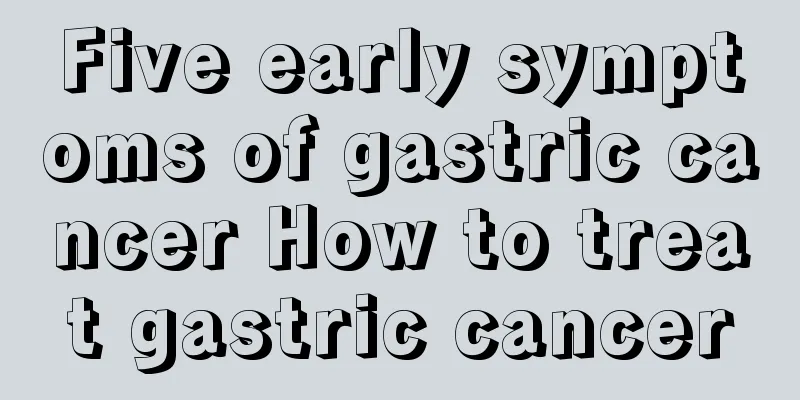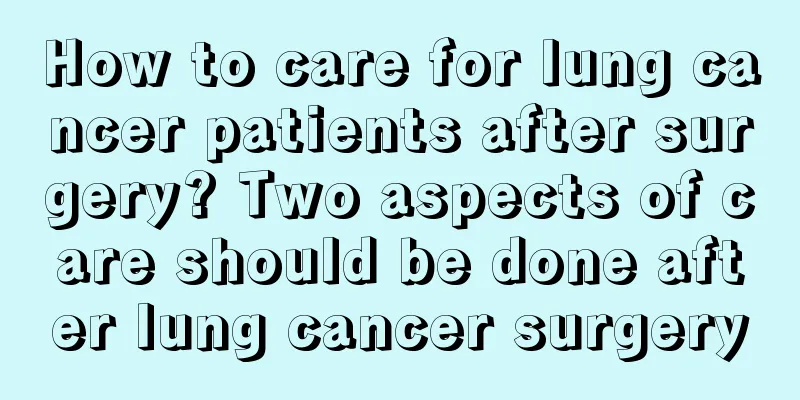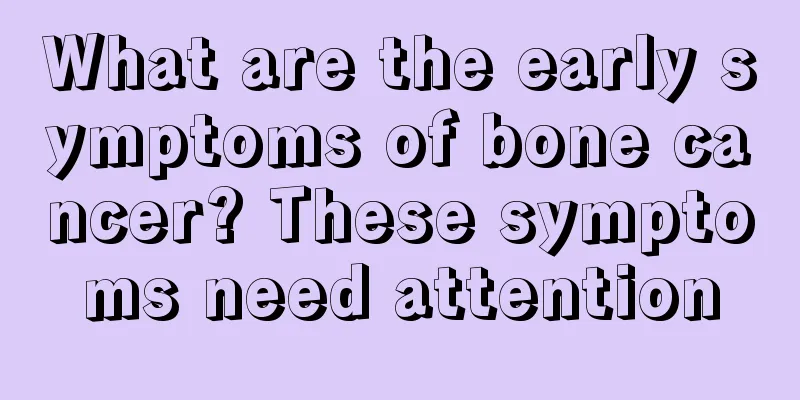Five early symptoms of gastric cancer How to treat gastric cancer

|
The five early symptoms of gastric cancer include stomach pain, loss of appetite, weight loss, nausea and vomiting, and black stools. If these symptoms occur, you should see a doctor as soon as possible for further examination and diagnosis. The treatment of gastric cancer mainly includes surgery, chemotherapy and targeted therapy. The specific treatment plan should be selected according to the patient's condition. 1. Five early symptoms of gastric cancer 1. Stomach pain This is one of the most common early symptoms of gastric cancer, usually manifested as dull pain or discomfort in the upper abdomen. The pain is often intermittent and is often mistaken for gastritis or gastric ulcer. As the disease progresses, the pain may worsen or become persistent. If stomach pain occurs for a long time without obvious causes, you should see a doctor as soon as possible. 2. Loss of appetite Loss of appetite is another common symptom of gastric cancer. Patients often feel uncomfortable or even lose their appetite after eating, especially against meat. This indicates that there may be lesions in the stomach that affect the normal digestive function. 3. Weight loss Even if the diet is not significantly reduced, the patient may lose weight significantly, which may be due to metabolic disorders caused by gastric cancer or reduced food intake. If unexplained weight loss occurs in a short period of time, special attention should be paid. 4. Nausea and vomiting Patients may also experience nausea or vomiting, especially after eating. This may be because the stomach tumor affects the emptying function of the stomach, and in severe cases, it may be accompanied by vomiting blood. 5. Abnormal stool color (black stool) Gastric bleeding caused by gastric cancer may cause the patient's stool to turn black (i.e. tarry stool), which is usually one of the important signs that the disease has entered a later stage. If the stool color continues to be abnormal, you must go to the hospital for treatment in time. Treatment of Gastric Cancer Treatment for gastric cancer requires a personalized plan based on the stage, tumor size, location, and the patient's physical condition. The following are some common treatments: 1. Surgery Surgery is the main method for treating gastric cancer, especially for patients with early-stage gastric cancer. - Partial gastrectomy: Suitable for patients with localized tumors, it removes the lesion and preserves some healthy stomach tissue. - Radical gastrectomy: This is for patients whose tumors have spread widely but have not yet metastasized to distant sites. The entire stomach is removed and the digestive tract is reconstructed. -Laparoscopic minimally invasive surgery: suitable for patients with early gastric cancer, with less trauma and faster recovery. 2. Chemotherapy Chemotherapy is usually used for postoperative adjuvant therapy or control of advanced gastric cancer. Commonly used chemotherapy drugs in clinical practice include 5-fluorouracil (5-FU), oxaliplatin and docetaxel, which can effectively relieve symptoms and prolong survival. 3. Targeted therapy Targeted drugs can prevent the growth of cancer cells by inhibiting tumor-specific molecular signaling pathways. For example, trastuzumab (Herceptin), a targeted drug targeting HER2 gene mutations, has significant effects on some patients. 3. The importance of early screening and life adjustment Prevention and early detection of gastric cancer are crucial to improving the cure rate, and regular screening and lifestyle intervention are particularly important. For example: - Regularly undergo gastroscopy examinations, especially for those with a family history of gastric cancer, who should undergo early screening; -Avoid long-term consumption of pickled, smoked and high-salt foods, and consume more fresh fruits and vegetables; - Pay special attention to the treatment and management of underlying gastric diseases such as chronic gastritis and gastric ulcer, conduct regular check-ups, and do not ignore changes in symptoms. If you find early symptoms of gastric cancer, do not delay and go to the hospital for examination and treatment as soon as possible to improve the treatment effect and survival rate. At the same time, maintaining a healthy diet and regular living habits can also help reduce the risk of gastric cancer. |
<<: Is dermatofibroma contagious?
>>: Do 30-year-olds with thyroid cancer not live long?
Recommend
Where is the liver
Everyone hopes that their body will not be troubl...
What to do if you lose your sense of taste due to nasopharyngeal cancer
What should I do if I lose my sense of taste due ...
What is the chance of a daughter inheriting colon cancer?
The incidence of colorectal cancer is increasing ...
What to do if there are mites in the cool mat
As the weather gradually gets warmer, mites begin...
How long to take anti-tuberculosis drugs before reducing the dosage
Anti-tuberculosis drugs cannot be stopped at will...
What are the complications of liver surgery?
For people, the most serious diseases occur in th...
Causes and treatments of belching
Belching, which is commonly known as hiccups, is ...
There are many warts on the neck
The growth of many warts on the neck is a very co...
What are the causes of ovarian cancer recurrence
Ovarian cancer can recur, which is caused by the ...
How to preserve fried chestnuts
Be sure to store the fried chestnuts carefully an...
My face is very oily after applying skin care products
If your face becomes oily after applying skin car...
Can I wash my hair when I have a cold
Although a cold is not a very serious disease, th...
What causes dull chest pain?
A dull pain in the chest is a common symptom amon...
Is ovarian tumor a serious disease?
Ovarian tumor is an ovarian disease that many wom...
Blood myeloma
If a person has a tumor, the most obvious change ...









